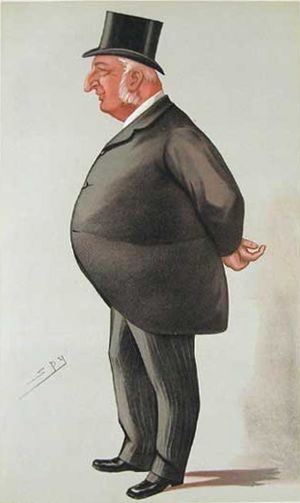William Cotton (Conservative politician) facts for kids
Sir William James Richmond Cotton (born November 13, 1822 – died June 4, 1902) was an important English businessman and politician. He was a member of the Conservative Party, a major political group in the United Kingdom. Sir William served as a Member of Parliament (MP) in the House of Commons, which is a main part of the UK's Parliament, from 1874 to 1885.
Contents
Early Life and Business Career
William Cotton was born in Stratford, London, a part of London. His parents were William Cotton and Caroline Richmond. As he grew up, he became a successful merchant in London. He owned iron mines in Norway, which is a country far north of the UK. He also owned important docks in London called Sun and Topping wharves, located near London Bridge.
Sir William was involved in many different businesses and public roles. He was a commissioner for the Inland Revenue, which collects taxes. He was also a director for a large insurance company called the Liverpool and London Globe Fire and Life Assurance Co. He served as a Justice of the Peace (J.P.) for several areas, including Middlesex, Hertfordshire, and the City of London. A J.P. helps keep peace and order in the community.
Public Service and City Roles
Cotton was a member of several old and respected London organizations called "Worshipful Companies." These included the Haberdashers Company, the Saddlers Company, the Turners Company, and the Fan Makers Company. He even led three of these companies as their "Master."
He also held many other important positions. He was a trustee for a church, chairman of the governors for the Mary Datchelor Girls' School, and a governor for the Royal Hospitals. He was also president of the City of London Rifle Corps, a group focused on shooting skills.
Leading the City of London
In 1866, William Cotton was chosen as an alderman for the City of London. An alderman is a senior member of a city council. He held this role until 1892. From 1868 to 1869, he served as the Sheriff of London and Middlesex.
His most important role in the city was being the Lord Mayor of London from 1875 to 1876. During his time as Lord Mayor, he opened a new market for poultry and food at Smithfield. He also hosted a big dinner to welcome the Prince of Wales (who later became King Edward VII) when he returned from a trip to India.
Political Career
Sir William Cotton first tried to become a Member of Parliament (MP) in 1868 for the area of Southwark, but he didn't win. However, in the general election of 1874, he was successfully elected as an MP for the City of London.
He served in Parliament until the 1885 general election. In that election, the number of MPs for the City of London was reduced from four to two because of a new law called the Redistribution of Seats Act 1885. Sir William lost his seat and was very disappointed. He never tried to return to Parliament after that.
Later Public Roles
Even after leaving Parliament, Cotton continued his public service. He was a member of the London School Board for nine years and became its chairman. This board was in charge of education in London. He also led the Police Committee for seventeen years, helping to oversee law enforcement in the city.
In 1892, he became the Chamberlain of the City of London, a very important financial role. In July of that same year, he was made a knight, which means he was given the title "Sir" for his services.
Personal Life and Legacy
Sir William Cotton also enjoyed writing. He published a book of poems called Imagination.
He passed away in London on June 4, 1902, at the age of 79. He is buried in the churchyard of St Mary the Virgin, East Barnet, a church near London.
Family Life
In October 1846, William Cotton married Caroline Richmond Pottinger. Lady Cotton, his wife, passed away on March 18, 1901. They had a large family with 12 children, and seven of them lived longer than their parents.
 | James Van Der Zee |
 | Alma Thomas |
 | Ellis Wilson |
 | Margaret Taylor-Burroughs |


